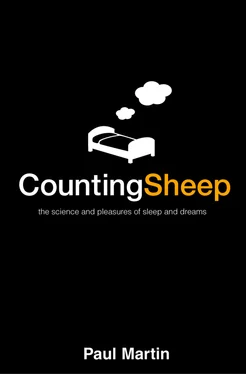We term sleep a death, and yet it is waking that kills us, and destroys those spirits that are the house of life.
Sir Thomas Browne, Religio Medici (1642)
What happens when sleep deprivation is taken to the extreme? If a slight insufficiency of sleep makes us feel unwell, would a prolonged absence kill us? Setting aside purely anecdotal accounts, science has unsurprisingly not investigated whether forcibly depriving humans of sleep is fatal. Ethical committees would tend to frown upon applications from scientists proposing to test this experimentally. But the evidence from other species is clear. Animals that have been experimentally deprived of sleep for long enough invariably die. There is no reason to suppose that humans are fundamentally different.
Some of the earliest experiments on extreme sleep deprivation were performed in the late nineteenth century by a Russian scientist called Marie de Manacéïne. She deprived puppies of sleep by keeping them constantly active. They all died within four or five days, despite every effort to keep them alive. The younger the puppy, the more rapidly it succumbed. Marie de Manacéïne also noticed a progressive decline in the body temperature of the sleep-deprived animals, a phenomenon that is now known to be a standard symptom of prolonged sleep deprivation in humans and other species. She concluded that sleep was even more crucial for survival than food:
As a rule, the puppy deprived of sleep for three or four days presents a more pitiful appearance than one which has passed ten or fifteen days without food. I can speak from observation, as I was obliged to make experiments on the results of want of food as well as of sleep, and I became firmly convinced that sleep is more necessary to animals endowed with consciousness than even food.
Italian scientists working at the end of the nineteenth century kept adult dogs awake by making them walk. The sleep-deprived dogs all died after 9–17 days, regardless of how much food they ate.
One objection to experiments such as these (apart from the obvious ethical one) is that the scientists had to use increasingly stressful methods to keep the animals awake, so perhaps it was the stress that killed them rather than the sleep deprivation itself. Prolonged stress can impair the immune system and make an animal more vulnerable to infection. However, more recent research has managed to sidestep this methodological problem.
In a long series of experiments, Alan Rechtschaffen and colleagues at the University of Chicago systematically investigated how prolonged sleep deprivation affects rats. They used an experimental procedure known as the disc-over-water method, which works like this. Two rats – the experimental subject and the ‘yoked control’ – are placed on a turntable mounted over a shallow bath of water. The brain-wave patterns of both animals are continuously monitored to detect the onset of sleep. When the experimental rat’s brain waves indicate that it is falling asleep, the turntable automatically revolves slowly, waking the unfortunate rat and forcing it to walk in the opposite direction to avoid being pitched into the water. The control animal, which is on the other side of the turntable and separated by a partition, receives precisely the same treatment at precisely the same times. The crucial difference is that the turntable movements are unaffected by its sleep. The control animal is therefore able to get some sleep when the experimental animal is awake. This cunning technique has the advantage – from the human experimenter’s point of view – of preventing the experimental subject from sleeping without having to subject it to other noxious stimuli.
Rats that are prevented in this way from sleeping invariably die after two or three weeks. The control animals, which experience the same stimuli but not the complete loss of sleep, survive and display relatively few symptoms. Before they die, the sleep-deprived rats all exhibit the same horrible syndrome. This is characterised by a debilitated appearance, skin lesions, increased food intake, weight loss, increased metabolic rate, increased levels of the hormone noradrenaline, and declining body temperature. Some of these changes are symptomatic of excessive heat loss from the body, which has led some scientists to suggest that sleep is crucial, among other things, for the regulation of body temperature.
A progressive rise in metabolic rate (the rate at which the body consumes energy) is an early symptom of sleep deprivation. Sleep-deprived rats eat more to compensate for their rising energy expenditure, but their weight and body temperature nonetheless continue to fall. Feeding them an easily digestible diet helps to slow this process somewhat, but it does not prevent them from dying. An increase in appetite is one of the less obvious effects of sleep deprivation in humans as well. Might it be that chronic sleep deprivation is one of the factors helping to fuel the epidemic of obesity that is currently sweeping the USA, UK and other industrialised nations?
Health may be as much injured by interrupted and insufficient sleep as by luxurious indulgence.
William Kitchiner, The Art of Invigorating and Prolonging Life (1822)
What of people? Research on humans has stopped short of the lethal sleep deprivation imposed on rats and puppies, but it has delved systematically into the consequences of a few days’ sleep loss. The results consistently show that moderate sleep deprivation has pervasive effects on the human body as well as the human mind. Sleep loss impairs vision, for example, causing blurring and errors in judging distances. It also triggers the familiar decline in body temperature that Marie de Manacéïine observed in her puppies, together with a reduction in blood glucose levels and changes in various hormones.
Set against this, sleep loss has surprisingly little impact on our ability to keep moving around and doing physical work. Moderate sleep deprivation does not greatly diminish our capacity for labour. Physically fit young adults can withstand several days of sleep deprivation without a substantial deterioration in their muscle strength, muscle endurance or cardiovascular responses to exercise. In one experiment, for example, the exercise capacity of young women was assessed following 60 hours without sleep. The sleep deprivation had no significant effect on their aerobic capacity or their endurance for exhausting exercise. In another study, researchers monitored two men while they played a marathon tennis match lasting a week, during which time the players got very little sleep. Although their mental performance deteriorated during the match, the players were able to sustain a high level of physical work. Our muscles can mostly keep going even when our brains are flagging.
Sleep deprivation does disturb many aspects of physiological functioning, however. Breathing is one example. A single night of sleep loss impairs breathing in healthy people, provoking a small but significant reduction in the maximum amount of air that can be exhaled after maximum inhalation. Sleep loss also leads to a substantial blunting of the normal respiratory responses to reduced blood-oxygen levels. After 30 hours without sleep there are marked deteriorations in the strength and endurance of the muscles used for breathing – as revealed, for example, by a reduction in the time for which people can breathe in against a sustained pressure. Such changes could be important in patients with respiratory diseases, who often suffer from chronic sleep loss. Sleep deprivation also slows the rate of cardiovascular recovery from intense exercise. When someone has been deprived of sleep for 24 hours, their breathing rate and oxygen uptake after a burst of intense exercise remain higher for longer.
Читать дальше












